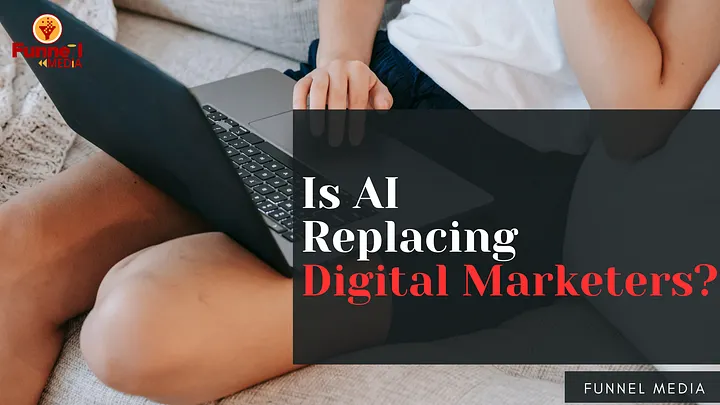Is AI Replacing Digital Marketing?

Table of Contents
Introduction: Digital Marketing in the Age of AI
What is AI and Generative AI?
Understanding AI in Simple Terms
How AI is Used in Digital Marketing
AI in Action
Benefits of AI in Digital Marketing
Why Marketers Love AI
Can AI Replace Digital Marketing Professionals?
The Reality Check
AI in Lead Generation
Smarter Leads with AI
Challenges of AI in Digital Marketing
What AI Can’t Do
Future of AI in Digital Marketing
Where Are We Heading?
Case Study: AI Enhancing Marketing Campaigns
Conclusion
1. Introduction: Digital Marketing in the Age of AI
Digital marketing is no longer limited to posting on social media or running paid ads. It has evolved into a sophisticated ecosystem that involves data-driven strategies, automation, content personalization, lead nurturing, and customer engagement. Businesses are investing heavily in digital marketing to increase ROI and build stronger relationships with their audience.
With the emergence of AI technology — including AI chat online, AI assistants, AI bots, and generative AI — many marketers are asking whether AI will replace human digital marketing professionals. The truth is, AI is changing the way marketing works but not replacing the human element entirely. It is a tool that enhances human creativity and efficiency, allowing agencies like Funnel Media Digital Marketing Agency in Gurgaon to deliver smarter campaigns with better results.
This blog explores how AI is transforming digital marketing, its benefits, challenges, and the role of marketers in this AI-driven era.
2. What is AI and Generative AI?
Understanding AI in Simple Terms
Before we explore AI’s impact on digital marketing, it’s important to understand what AI actually is. Artificial Intelligence (AI) is the capability of machines to perform tasks that typically require human intelligence, such as decision-making, pattern recognition, and problem-solving.
Generative AI is a subset of AI that can create original content, from writing blogs to designing images or generating video scripts. Tools like Midjourney artificial intelligence and other AI web applications have made it easier for marketers to produce high-quality content in a fraction of the time.
AI chatbots and AI assistants are also becoming standard tools for businesses. They can handle customer queries, schedule appointments, provide product information, and even generate leads — all automatically. These AI-powered systems help businesses operate 24/7, improve customer engagement, and streamline workflows.
In short, AI technology is an enabler, giving marketers the tools to scale their efforts while focusing on creative strategy.
3. How AI is Used in Digital Marketing?
AI in Action
AI is no longer a futuristic concept — it is actively used in every area of digital marketing. Here’s how:
1. Content Creation
AI-powered platforms like AI websites and artificial intelligence websites are revolutionizing content creation. They can generate high-quality blog posts, social media content, video scripts, email campaigns, and ad copy within minutes.
How it works: These platforms use natural language processing (NLP) and generative AI algorithms to understand the topic, tone, and target audience. They can research online content, extract key information, and produce coherent and engaging content.
Practical Impact:
- Marketers save hours or even days of manual work.
- Consistent publishing becomes easier, which is crucial for SEO and audience engagement.
- Content can be adapted across multiple channels instantly.
Example: A digital marketing agency in Gurgaon used an AI website to create 10 blog drafts in one day that would normally take a team of writers a week. This allowed them to focus on strategic editing, visuals, and distribution.
2. Customer Engagement
AI chat and chatbot AI have transformed the way brands communicate with customers. These tools provide instant, automated responses, ensuring that customer queries are addressed 24/7.
How it works: Chatbots use AI algorithms to understand user intent, recognize keywords, and provide accurate responses. Advanced chatbots can even engage in multi-turn conversations, mimicking human interaction.
Practical Impact:
- Customers get immediate assistance, improving satisfaction and trust.
- Marketing teams can focus on complex queries while AI handles repetitive questions.
- Chatbots can collect valuable customer data, preferences, and feedback.
Example: A fashion brand in Delhi implemented an AI chatbot online that answered frequently asked questions, suggested products based on user preferences, and reduced customer response time from 24 hours to under 2 minutes.
3. Data Analysis
AI and data science play a critical role in transforming raw data into actionable insights. With AI algorithms, marketers can process vast amounts of data from social media, websites, CRM tools, and ad campaigns.
How it works: AI uses machine learning and predictive analytics to detect patterns, forecast trends, and identify opportunities. This helps marketers make informed decisions and tailor campaigns to audience behavior.
Practical Impact:
- Identifies the most effective marketing channels and strategies.
- Predicts customer preferences and future buying behavior.
- Optimizes content and ads for better engagement and conversions.
Example: A real estate agency in Gurgaon analyzed social media engagement patterns using AI data science tools, allowing them to focus ad budgets on platforms that brought 40% higher lead conversions.
4. Ad Optimization
AI deep learning algorithms can automatically optimize ads to achieve maximum ROI. Unlike manual processes, AI can instantly analyze ad performance and adjust campaigns in real-time.
How it works: AI monitors metrics like click-through rates (CTR), cost-per-click (CPC), and conversion rates. It then automatically adjusts targeting, bidding, and ad placement to improve performance.
Practical Impact:
- Reduces wasted ad spend by targeting only high-potential audiences.
- Improves campaign performance faster than manual A/B testing.
- Allows marketers to run multiple ad variations without extra effort.
Example: An e-commerce brand in Delhi used AI-powered ad optimization for its Google Ads campaigns, resulting in a 30% reduction in CPC and a 25% increase in overall conversions in just one month.
5. Lead Generation
AI chatbot online and AI bots are revolutionizing lead generation by identifying potential customers, nurturing them, and increasing conversion rates.
How it works: AI bots track user behavior on websites and social media, score leads based on engagement, and personalize follow-ups automatically. This ensures that only high-quality leads reach the sales team.
Practical Impact:
- Reduces manual effort in identifying and qualifying leads.
- Increases the speed of nurturing leads with personalized communication.
- Improves the chances of converting leads into loyal customers.
Example: A tech startup in Gurgaon integrated AI bots on its landing page. Within three months, the startup saw a 40% increase in qualified leads and a 20% boost in demo requests, all while reducing manual follow-ups.
Businesses in Gurgaon and across India are adopting AI to enhance their marketing campaigns. By integrating AI technology, agencies can deliver personalized experiences, reduce human error, and focus on creativity and strategy rather than repetitive tasks.
4. Benefits of AI in Digital Marketing
Why Marketers Love AI
AI is no longer just a buzzword — it has become a critical part of modern digital marketing strategies. Marketers love AI because it helps them work smarter, faster, and more effectively. Let’s explore the key benefits in detail:
1. Automation of Repetitive Tasks
One of the most significant advantages of AI is its ability to automate repetitive marketing tasks. From scheduling social media posts to sending automated email campaigns and generating performance reports, AI handles it all.
How it works: AI tools like automated social media schedulers, email automation platforms, and AI reporting dashboards allow marketers to set rules and workflows. Once configured, AI executes tasks without human intervention.
Practical Impact:
- Saves hours of manual work every week, allowing marketers to focus on strategy and creativity.
- Reduces human errors that occur in repetitive tasks such as forgetting to post content or sending emails to the wrong segment.
- Ensures consistency in messaging and timing, which is essential for building brand credibility.
Example: A digital marketing agency in Gurgaon used an AI-powered scheduling tool to automate its social media posts for 10 clients. This reduced manual posting efforts by 70% and ensured posts were published at optimal engagement times.
2. Enhanced Customer Engagement
AI-powered chatbots and virtual assistants enable businesses to engage with customers instantly and continuously. This not only improves response time but also enhances the overall customer experience.
How it works: Chatbots use natural language processing (NLP) to understand customer queries and provide relevant responses. Advanced chatbots can even engage in multi-turn conversations, remember past interactions, and personalize communication.
Practical Impact:
- Customers get instant responses, reducing wait times and improving satisfaction.
- AI collects valuable data on customer preferences, which can be used to refine marketing campaigns.
- Personalized interactions increase customer loyalty and engagement.
Example: A fashion retailer in Delhi integrated an AI chatbot online for its website and social media channels. The chatbot suggested products based on user preferences, handled order tracking, and answered FAQs, resulting in a 25% increase in customer engagement and repeat purchases.
3. Real-Time Insights
Data is the backbone of modern marketing, and AI enables marketers to analyze it in real-time. AI data science tools provide actionable insights on customer behavior, campaign performance, and engagement trends.
How it works: AI algorithms process large datasets from multiple sources — website analytics, social media, CRM systems, and ad campaigns. They detect patterns, predict outcomes, and generate reports that are easy to understand.
Practical Impact:
- Enables data-driven decision-making, improving campaign effectiveness.
- Helps marketers quickly identify what works and what doesn’t, allowing them to pivot strategies on the fly.
- Provides predictive insights, such as identifying potential high-value customers or forecasting future trends.
Example: A tech startup in Gurgaon used AI data science tools to analyze website traffic and ad campaign performance. By identifying top-performing content and optimizing underperforming ads, they improved lead quality by 30% within two months.
4. Increased ROI
AI deep learning algorithms optimize campaigns by targeting the right audience and adjusting bids and budgets automatically. This ensures that every marketing dollar is spent efficiently.
How it works: AI analyzes audience behavior, engagement patterns, and conversion rates to make real-time adjustments in ad campaigns. This includes optimizing ad placement, timing, and content for maximum results.
Practical Impact:
- Reduces wasted ad spend on audiences unlikely to convert.
- Improves campaign performance without constant manual intervention.
- Provides measurable ROI, helping marketers justify their budgets and strategies.
Example: An e-commerce brand in Delhi integrated AI into its Google Ads campaigns. The AI system automatically reallocated budget to top-performing ads, optimized bidding strategies, and improved CTR by 35%, resulting in a 28% increase in overall sales.
5. Scalability
AI allows marketing campaigns to scale effortlessly. Traditional marketing efforts often require a proportional increase in manpower as campaigns grow. With AI, large campaigns targeting multiple audiences can be managed efficiently without adding extra human resources.
How it works: AI platforms can handle multiple campaigns simultaneously, analyze engagement across various channels, and automate repetitive tasks. They can also personalize messages for different segments at scale.
Practical Impact:
- Marketers can manage larger campaigns with fewer resources.
- Personalized communication becomes possible for thousands or even millions of users simultaneously.
- Businesses can expand their reach without increasing operational costs.
Example: A real estate company in Gurgaon used AI-powered email marketing and chatbots to manage campaigns for over 50 property listings simultaneously. The campaigns were personalized for different buyer segments, resulting in a 40% increase in lead generation without hiring additional staff.
These benefits allow marketers to focus on strategy, creativity, and brand storytelling, while AI handles analytics, automation, and repetitive tasks. This combination ensures campaigns are more effective, targeted, and measurable.
5. Can AI Replace Digital Marketing Professionals?
The Reality Check
AI is undeniably transforming digital marketing, but it cannot replace human marketers entirely. While AI tools can handle repetitive tasks, analyze data, and generate content, certain aspects of marketing require human intuition, creativity, and emotional intelligence.
1. Creativity and Emotional Intelligence
AI can generate blogs, social media posts, and even ad copy using generative AI. However, it lacks the human touch necessary for storytelling, brand voice, and emotional resonance.
Example: A travel brand wants to create a campaign that evokes nostalgia and wanderlust. AI can draft text and suggest visuals, but the emotional nuance — connecting with the audience’s feelings — is best handled by human marketers.
Impact: Human creativity ensures campaigns are memorable, emotionally engaging, and aligned with brand values, something AI cannot fully replicate.
2. Strategic Thinking
Understanding market psychology, analyzing competitors, and planning long-term brand strategy require human insight. AI can provide data-driven suggestions, but interpreting complex market dynamics and making strategic decisions needs human judgment.
Example: During a product launch, AI might recommend targeting a specific demographic based on past behavior, but a human strategist can consider broader trends, cultural context, and seasonal factors to optimize results.
Impact: Strategic thinking ensures campaigns are not just automated but also aligned with business goals, competitive positioning, and brand growth.
3. Brand Authenticity
AI-generated content, if overused, can become repetitive or generic. This can harm brand reputation, especially in industries where authenticity matters, like fashion, luxury, or healthcare.
Example: A skincare brand using AI for social media posts might produce technically correct content, but without a human touch, the messaging may feel impersonal or disconnected from the audience.
Impact: Human oversight ensures that AI-enhanced campaigns maintain authenticity, brand voice, and emotional engagement.
Agencies like Funnel Media Digital Marketing Agency use AI as a supportive tool, enabling marketers to leverage data-driven insights while focusing on creativity, personalization, and strategic storytelling. The combination of AI and human expertise creates campaigns that truly resonate with audiences.
6. AI in Lead Generation
Smarter Leads with AI
Lead generation is the lifeblood of any digital marketing strategy. AI enhances this process by improving targeting, engagement, and follow-ups.
1. Identifying High-Quality Leads
AI bots analyze user behavior, browsing history, engagement patterns, and interactions to identify prospects most likely to convert.
Example: A real estate firm in Gurgaon used AI to analyze website traffic and property inquiries. The AI identified high-value leads based on behavior patterns, such as multiple property views or repeated site visits.
Impact: Marketers can focus on leads with the highest potential, saving time and increasing conversion rates.
2. 24/7 Customer Engagement
AI chatbot online ensures leads are engaged around the clock. Whether it’s answering FAQs, providing product information, or scheduling appointments, AI bots maintain continuous communication.
Example: An e-commerce store integrated AI chatbots on its landing pages. Even outside business hours, potential buyers received instant assistance, reducing abandoned carts by 20%.
Impact: Continuous engagement increases trust, reduces missed opportunities, and accelerates the customer journey.
3. Data-Driven Follow-Ups
AI tracks user interactions and recommends personalized follow-ups. This includes automated emails, reminders, or tailored offers, depending on the lead’s behavior.
Example: A tech startup in Gurgaon used AI to send personalized demo invitations to leads who had interacted with specific product pages. This increased demo sign-ups by 35%.
Impact: Personalized, timely follow-ups improve lead conversion while allowing marketing teams to focus on strategy rather than manual follow-up tasks.
By integrating AI into lead generation strategies, businesses can nurture leads efficiently, prioritize high-value prospects, and ultimately convert more leads into loyal customers.
7. Challenges of AI in Digital Marketing
What AI Can’t Do
While AI is a game-changer, it comes with limitations that marketers must consider.
1. Lack of Emotional Intelligence
AI cannot truly understand human emotions. While it can analyze sentiment or tone, it cannot experience empathy or intuitively understand cultural nuances.
Impact: Campaigns relying solely on AI risk being cold, robotic, or tone-deaf, particularly in sensitive industries like healthcare, finance, or luxury products.
2. Risk of Generic Content
AI-generated content can become repetitive or formulaic if overused. Without human input, marketing messages may fail to stand out or engage audiences effectively.
Impact: Brands may lose differentiation, which can affect audience retention and engagement.
3. Data Dependency
AI requires high-quality, accurate, and sufficient data. Poor or biased data can lead to flawed predictions, targeting errors, or ineffective campaigns.
Impact: Marketers need to ensure data accuracy and maintain oversight to validate AI recommendations.
Balancing AI automation with human oversight ensures campaigns remain authentic, creative, and strategically effective.
8. Future of AI in Digital Marketing
Where Are We Heading?
The future of digital marketing lies in a hybrid approach, where AI supports marketers instead of replacing them.
1. AI-Powered Personalization
Predictive analytics and machine learning will enable highly personalized campaigns at scale, tailoring content, offers, and communication for each customer segment.
Example: An online fashion retailer can send personalized style recommendations to thousands of users automatically, based on past behavior and AI predictions.
2. Enhanced Decision-Making
Artificial General Intelligence (AGI) in the future may assist in complex decision-making, helping marketers evaluate long-term trends, cross-industry insights, and market opportunities.
Impact: Marketers can make smarter, data-backed decisions while focusing on creativity and innovation.
3. Collaboration Between AI and Humans
AI will handle data analysis, automation, and repetitive tasks, while human marketers focus on strategy, creative campaigns, and emotional engagement.
Impact: This combination ensures campaigns are efficient, data-driven, and emotionally resonant. Businesses that embrace AI without abandoning human expertise will thrive.
9. Case Study: AI Enhancing Marketing Campaigns
A Gurgaon-based business integrated AI chatbot online on its AI website:
- Engaged visitors 24/7 with automated chat.
- Analyzed visitor behavior with AI data science tools.
- Provided personalized offers and recommendations.
Results:
- 35% increase in qualified leads.
- 25% higher conversion rates.
- Reduced manual follow-up workload for the marketing team.
This case demonstrates that AI acts as a supportive tool, amplifying human marketing efforts rather than replacing them. Human creativity, strategy, and oversight remain critical to success.
10. Conclusion
AI is transforming digital marketing, but it is not replacing marketers. Generative AI, AI chat online, AI applications, and AI assistants enhance efficiency, lead generation, and campaign insights. Agencies like Funnel Media Digital Marketing Agency in Gurgaon combine AI technology with human creativity to deliver effective, targeted, and impactful campaigns.
Leverage the power of AI in your marketing strategy with Funnel Media Digital Marketing Agency in Gurgaon. Combine human creativity with AI efficiency to maximize your results.





